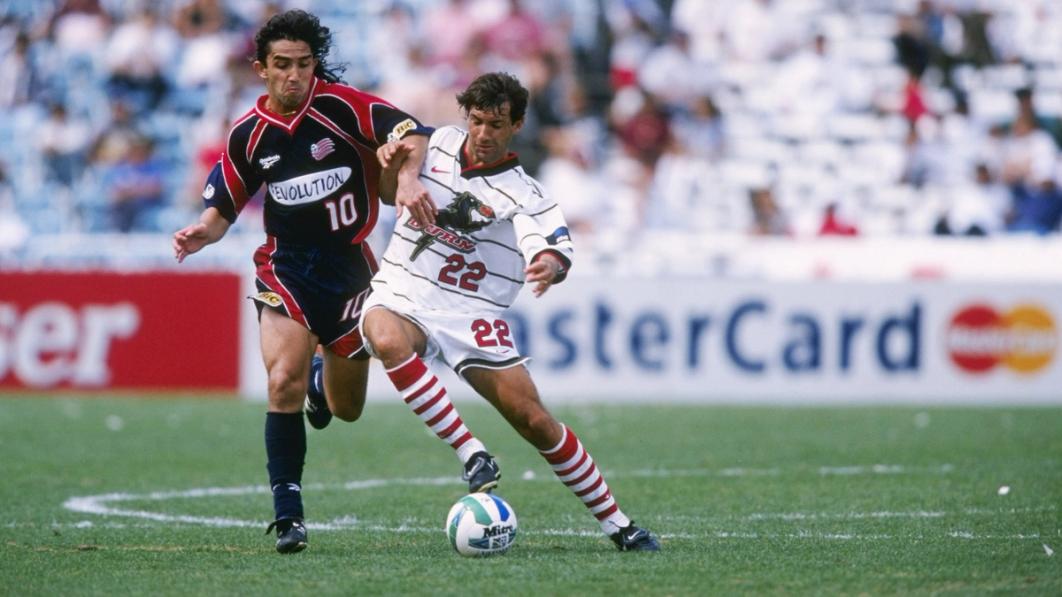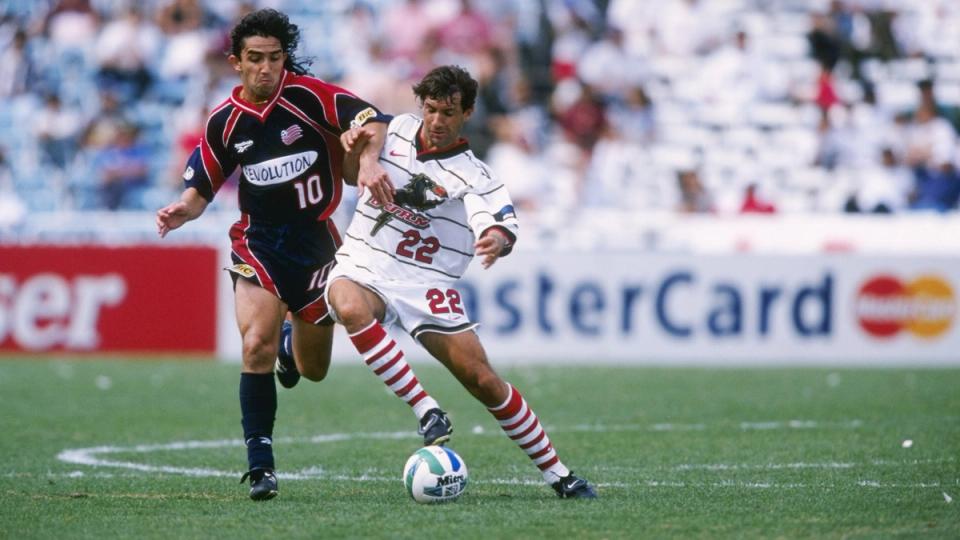Rockets of Old to Today’s Austin FC: 34 Years of Texas and the U.S. Open Cup Final
We take a closer look at the Lone Star State’s history in Open Cup Deciders as Nico Estevez’s Austin FC look to become our third tournament winner from Texas.



It took Texas – a state bigger than many countries – a full 77 years to send a team to the historic U.S. Open Cup Final. Join us for a look back at the Lone Star State’s flirtations with America’s oldest soccer trophy, from the Richardson Rockets and El Paso Patriots of the 1990s to FC Dallas and the rise of Houston Dynamo in this century – all the way on up to today’s Austin FC.
The young MLS club from the Texan capital will play against fellow MLS side Nashville SC in the 2025 Decider at Q2 Stadium on Oct. 1 (LIVE on Paramount+ and on air at CBS Sports Network).
The Richardson Rockets (later known as the Dallas Rockets) were a top team in the early days of the SISL (later the USISL). Curtis Partain, a local speedster and UCLA Bruin, who got his first taste of the game on the Dallas area’s bumpy YMCA fields, was the first player signed by the club. He remembers playing more than 70 games a season both indoor and outdoor. “One year, I collected the Do Not Disturb signs from our hotels and I think I had 52 from 52 weeks!”
Partain, now 57, and his Rockets raced through the 1991 Open Cup with wins over amateur and semi-pro stalwarts of yesteryear like Atlanta Datagraphic, FC Galveston (8-2) and a tight 1-0 Semifinal over the New Mexico Chiles that the ex-striker remembers as a “bloodbath.”
It might have been an ominous sign when the Rockets’ plane was struck by lightning on approach to JFK airport the day before that year’s Final, but they still considered themselves favorites against their hosts, the Brooklyn Italians. However, it wasn’t meant to be on that hot August day on the primitive AstroTurf at Brooklyn College that got so hot it forced Partain and his teammates to play in flats lined with heavy-duty aluminum foil to keep their feet from burning.
“They were a proper team [the Italians] and they beat us and deserved it,” Partain said. “We played and we lost – and that’s just how it goes.”
What Partain remembers best of that day wasn’t the 1-0 loss on a sixth-minute breakaway by Ernest Inneh or playing a man up for most of the game after the ejection of Brooklyn’s Bill Manning. His most vivid memories are of the dinner that followed the game.
“The Brooklyn Italians invited us to this restaurant out on Coney Island (Gargiulo’s – opened in 1907 and still operating today),” said Partain, his voice rising with the recollection of a party for the ages. “And when I say it was the world’s greatest Italian meal, it was just ridiculous. It couldn’t be replicated.”
By the time the party ended – seven courses, four hours (and more than a few glasses of wine) later – the Rockets hardly remembered the loss. “I won an NBA championship ring with the Dallas Mavericks [Partain went on to have a career as a sports executive] but to this day there’s still nothing like that celebration on Coney Island after losing the Open Cup Final!”
Four years later, in 1995, the El Paso Patriots had their own chance to become the first team from Texas to lift the Open Cup. A semi-pro team out of the USISL A-League, they drew the long straw to host the Richmond Kickers, a gaggle of recently graduated top college talent, many of whom would go on to play in the early days of MLS.
It was only the second-ever Open Cup Final hosted in Texas (The New York Pancyprian Freedoms won their third title by beating St. Louis’ Kutis at 12,000-seat Delmar Stadium in Houston in July of 1983) but the first with a Texas team taking part.
“Our team was really unique – we had our own stadium – and even though we weren’t the most skilled team in the world, we beat teams that were better than us because of our togetherness,” said Brian O’Haver, the right back who joined up with the Patriots one summer on break from the University of Rhode Island.
The Patriots were named after the Patriot missile, a nod to El Paso’s Fort Bliss, which is home to the U.S. Army’s First Armored Division. They trained in high altitude and high temperatures and were loaded with talent, a core with experience in Mexico’s top professional division. The Final was played in extreme heat, which should have given the home side the edge. But even after going a man up and suffering through 120 minutes and a penalty shootout, the Patriots came up short despite having former Veracruz and Chivas striker Salvador Mercado in the side.
“He [Mercado] was amazing,” said O’Haver, now a 55-year-old design executive in his native North Carolina. “He had something none of us college guys did. A professionalism and a mental toughness.”
Despite his successes off the field, O’Haver still remembers a missed opportunity that day in El Paso. “It was the beginning of the second overtime and Mercado put the ball right on my foot in the penalty area.
“We made eye contact and I had it, but I made a cardinal sin: I was already thinking about the celebration before I put the ball in the net,” said O’Haver of the miss that would have ended the game – that year’s Final having taken place in the golden-goal era of sudden death overtime. “It still haunts me a little.”
It wasn’t until 1997 – 83 years deep into the Open Cup – that the state of Texas finally grabbed a first title. The Dallas Burn (now FC Dallas) roared through the New Orleans Riverboat Gamblers, Chicago Stingers and a tight 2-1 golden-goal Semifinal over the MetroStars (now the New York Red Bulls). They went on to beat D.C. United – reigning Open Cup champs at the time, who were hunting a league/Cup Double that year – in a goalless Final that needed penalties to decide it.
“We wanted to bring a trophy home,” said Dante Washington, the Burn’s top-scorer that year in Major League Soccer with 13 goals. “We had a really good team. One thing I remember about that Final was it was a really cold day in Indiana. [The game was played on Oct. 29, late in the season for an Open Cup Final).
It was a day of high emotions in the Burn locker room as goalkeeper Mark Dodd’s mother had passed away only a few days before the big game. “As a team, you rally around your teammate – your friend – in moments like that,” said Washington, a speedy and powerful striker with a nose for goal who had previous experience in the Open Cup with D.C. area men’s league regulars the Greek Americans. “We really felt it and he went on to have an incredible game, and came up big in the penalty shootout.”
Washington, who starred for the Radford Highlanders at collegiate level, was spared having to take a penalty on the day. “I was next up, waiting at midfield. I was the next shooter when Jorge Rodriguez scored the winner for us,” he recalled. “Any time you can lift a trophy, it’s something that stays with you. I still remember the feeling.”
The Burn, renamed FC Dallas, would win in 2016 too. But there was suffering to do before that trophy went up again. Oscar Pareja was a player in 2005 and an assistant coach in 2007 when they lost a pair of Finals. “I really wanted to win something for my club,” said Pareja, who was born in Colombia and spent six seasons in Dallas. “As a player I wanted to get that trophy because my career was winding down and you’re not going to get more chances.
“After so many years as a professional you have to learn how to wash your pain,” he said of the disappointment of losing to the LA Galaxy in Carson, California in 2005 and the New England Revolution at home in Frisco, Texas in 2007. “It was a great opportunity to win something and I do remember the pain of it. But win or lose, you have to move on.”
Move on he did. Pareja was named head coach of FC Dallas in 2014 and he channeled the pain of losing two Finals into making sure he wouldn’t come up short in 2016. Against the New England Revolution again, he orchestrated an impressive 3-2 win that sent fireworks up into the Dallas sky for the first time – a first time a Texas team had won the Open Cup on home soil.
“In 2016 we had that same feeling of responsibility – to win something for the club,” said Pareja, who would win another Open Cup as head coach of Orlando City in 2022. “After many years of not winning it, I had it in front of me again. I couldn’t let it go.”
The Houston Dynamo twice added their name to the short list of Texas clubs to win the U.S. Open Cup in 2018 and 2023. Former USMNT star DaMarcus Beasley captained the side to the 2018 crown – winning his last trophy before a well-earned retirement.
On September 26th 2018 that Dynamo side, led in attack by top-scorer Mauro Manotas and boasting former Swiss international Philippe Senderos, won a fifth Open Cup home game in a row to seal the deal.
The Final was against fellow MLS outfit the Philadelphia Union – who offered precious little resistance. A 3-0 win meant a first-ever Open Cup crown for the two-time MLS champions and the Dynamo became only the second team from Texas to lift the trophy.
The Dynamo repeated the act in 2023, when, on September 27th of that year, they bested an Inter Miami side (without injured Lionel Messi) to become the first team to win an Open Cup Final away from home since 2013.
A wonder goal from Griffin Dorsey and another from Amine Bassi were the difference on the day for Ben Olsen’s side in a dramatic 2-1 win. “We came into the game maybe not the most recognized team in the league, with everyone talking about Miami and their stars, but we were able to do something special,” said Dynamo defender Erik Sviatchenko.
Up next with a chance to bring glory to the great state of Texas in 2025 is Austin FC – a club only five years old and led, on the field, by veteran midfielder and two-time Open Cup Champion (with LAFC and Sporting KC) Ilie Sanchez.
“The trophy is there,” said Sanchez on the eve of a first major Final for the club. “The ultimate goal – the cherry on the cake – that’s what we play for. It’s what we train for and it's what we have in mind every single day.”
Will it be more history – and a third winner – for the Lone Star State? Let’s all just wait and see.
Fontela is editor-in-chief of usopencup.com. Follow him at @jonahfontela on Twitter.